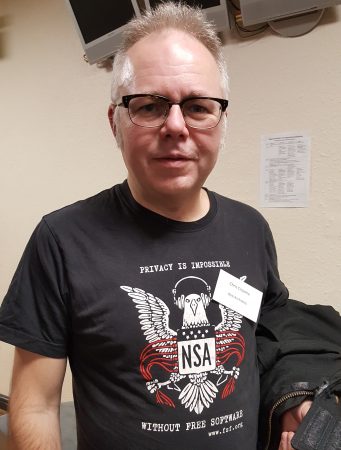Two years ago, the UK’s tech co-ops joined up in a network to show how technology can be an empowering force for good. Can they drive change into a sector dominated by the big players?
Those new to tech and platform co-ops got to learn more about them in a workshop at the Co-operative Ways Forward 6 conference in Manchester on 16 February.
Launched in 2016, Co-operative Technologists (CoTech) aims to create a better technology sector in the UK that focuses primarily on worker, customer and end-user needs rather than on generating private profit. The network includes web development, web hosting and design co-ops.
One of the speakers at the event, Graham Mitchell, is founding member of Digital Life Collective, a co-op researching, developing and funding technologies that prioritise autonomies.
He argued that co-ops could be at the forefront of delivering #techforgood, or technology solutions that people could trust. Mr Mitchell referred to the concept of platform co-operatives, or multistakeholder co-operatives where users, customers and employees would play a key role in driving the business.
However, he believes that real platform co-operatives had yet to be set up, not only in the UK, but also in the USA, where the term was initially coined.
The closest to the idea of a platform co-op, he said, is Stocksy, a co-operative of photographers providing stock photography services. It was formed in 2012 and now represents artists in 65 different countries, paying out one of the highest royalty percentages in the industry. The co-op has over 900 voting member photographers. However, customers cannot join the co-op, said Mr Mitchell, who thinks that a real platform co-op should bring together both providers and users.
He believes that one of the main challenges in developing such projects is the lack of venture capital and a model to finance tech firms like co-ops, which have a long-term approach and are not listed on the stock exchange. Co-operative development specialists can also play a key role in driving the tech co-ops movement.
“We can’t wait for the hobbyists – the IT people in dark rooms – to come up with ideas for vibrant platform co-ops,” he told delegates.
Another problem faced when trying to develop such projects is being geographically isolated.
“We need to think outside a geographical mindset; such businesses are formed online by people from across the world,” he added.

Chris Croome from Webarchitects co-op also addressed the workshop. He talked about the open source software movement, which grew out of the need to use software without paying for copyright. The users are free to copy software and give it to anyone else but whenever they pass it on they have to give them these same freedoms. The approach enables anyone to obtain and change the open source code.
“The free software movement is all about sharing, like co-ops, there should be more interaction between the two,” he said.
One of the pioneers of free software was US programmer Richard Stallman, who developed the concept of copyleft, which uses the principles of copyright law to preserve the right to use, modify and distribute free software.
The rapid growth 20 years ago of open source software raised the question of whether platform co-ops are the next big thing, delegates were told.

